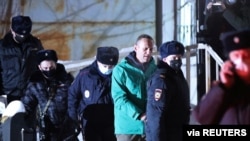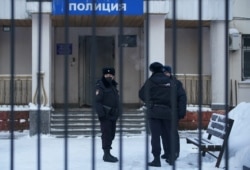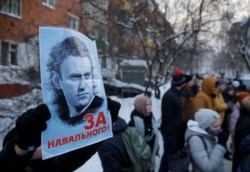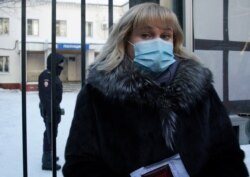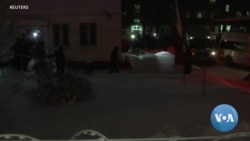A Russian court on Monday sentenced opposition leader Alexei Navalny to 30 days in a Moscow prison over parole violations, setting the stage for a later trial that could send the Kremlin’s most vocal critic to prison for several years.
The court ruling came less than a day after Navalny was detained upon arrival of his flight from Germany to a Moscow airport, ending a lengthy recuperation abroad after a poisoning attack in Siberia last August.
Navalny insists Russia’s security services, with backing from longtime President Vladimir Putin, were behind the assassination attempt that involved the use of a strain of the Soviet-era military nerve agent Novichok.
Independent media investigations have detailed extensive state surveillance of Navalny in the days and weeks leading up to the attack.
Putin has acknowledged his government’s tracking of the opposition figure but insisted Navalny is too politically insignificant for the state to want him dead.
Pop-up justice
The circumstances surrounding Tuesday’s legal proceedings were highly unusual by Russian standards.
Authorities converted the Moscow suburban police station where the opposition leader had been held for less than 24 hours into a makeshift courtroom.
Navalny and his legal team were given little advance notice of the hearing, in sharp contrast to Russian state media cameramen who were in position to film the deliberations as they unfolded.
Navalny labeled the proceedings a desperate intimidation effort by Putin and his allies.
"I've seen a lot of mockery of justice,” Navalny said in a video posted to social media from the courtroom. "This is beyond the height of lawlessness.”
Adding to the surreal atmosphere: A portrait of Genrikh Yagoda, the one-time head of the Soviet secret police, hung on the station’s wall as the judge ordered Navalny delivered to Moscow’s high-security Matrosskaya Tishina prison.
Several hundred supporters gathered outside in subzero temperatures and chanted slogans of support. Rights groups reported dozens of arrests.
In the video posted after the judge’s ruling, Navalny called on Russians not to fear the consequences of protest.
“Take to the streets. Don’t do it for me, do it for yourselves and for your future,” he said. “They’re afraid of you. People who refuse to stay silent.”
Navalny’s allies later announced they would launch a nationwide protest January 23.
Welcome home, sort of
Navalny was detained Monday at Moscow’s Sheremetyevo airport by police as he attempted to reenter the country following nearly five months of convalescence in Berlin, Germany.
His arrival came with additional surprises: air traffic authorities diverted Navalny's plane to the Sheremetyevo airport at the last minute, claiming "technical issues."
Several thousand supporters — and riot police — had gathered to greet Navalny at Vnukovo airport across town.
In the days leading up to Navalny’s return, Russia’s federal prison service warned it would seek the opposition figure’s arrest for violating the terms of a suspended sentence dating back to 2014.
The move was widely seen as an attempt to persuade Navalny to remain abroad.
Indeed, Navalny insists his reason for missing parole hearings was obvious: He was recovering from the August poisoning attack that nearly took his life.
The opposition figure also noted that a 2017 European Court of Human Rights ruling backed his assertion that the conviction was politically motivated.
And yet, the move by Russian authorities meant that — suddenly — Navalny faced the real possibility of a 3½-year prison term should he return home.
International condemnation, Kremlin pushback
Navalny’s case has proved yet another irritant in already poor East-West relations, with the United States, Canada, Great Britain and the European Union condemning the arrest.
In Washington, both the outgoing Trump administration and incoming Biden team have demanded Navalny’s release.
On Monday, the U.N. Human Rights Commission also backed those demands.
“We are deeply troubled by the arrest of Aleksey Navalny and call for his immediate release and for his due process rights to be respected in line with the rule of law,” the commission said in a tweet. "We reiterate our call for a thorough and impartial investigation into his poisoning.”
On Monday, German Foreign Minister Heiko Maas, whose government had hosted Navalny during his recovery, also expressed incredulity that the Russian had been jailed despite the poisoning ordeal.
"It is completely incomprehensible that he was detained by Russian authorities immediately after his arrival,” Mass said.
Yet Russia’s Foreign Ministry argued that Western governments were intentionally hyping the case in an attempt to interfere in what they argue is an internal affair.
"The Navalny case has acquired a foreign policy dimension artificially and absolutely illegitimately,” Foreign Minister Sergei Lavrov said during a press conference Monday. “Everything that happens to Navalny in connection with his return and detention is within the purview of law enforcement agencies.”




